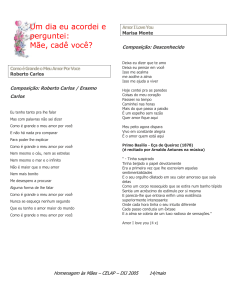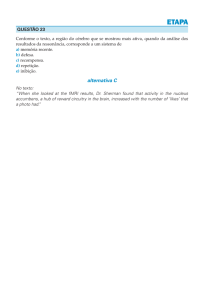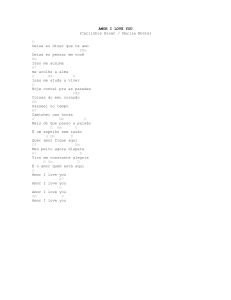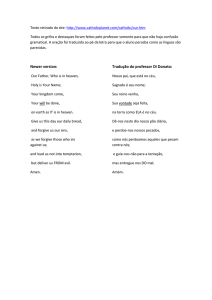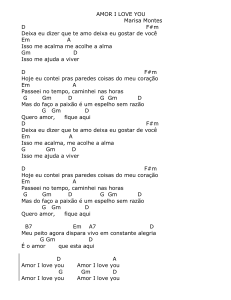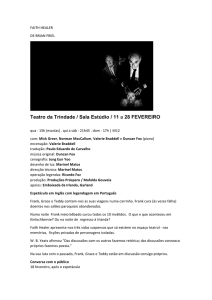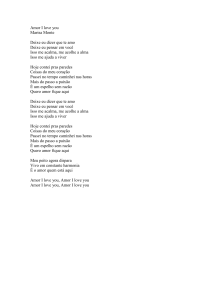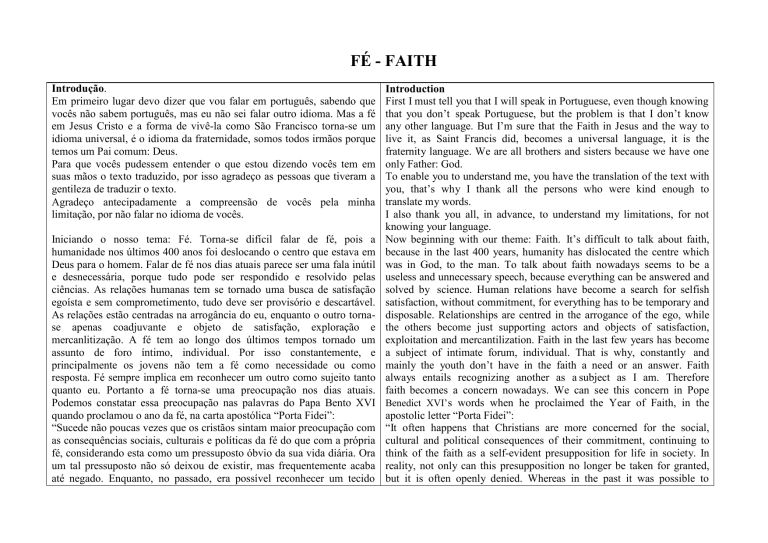
FÉ - FAITH
Introdução.
Em primeiro lugar devo dizer que vou falar em português, sabendo que
vocês não sabem português, mas eu não sei falar outro idioma. Mas a fé
em Jesus Cristo e a forma de vivê-la como São Francisco torna-se um
idioma universal, é o idioma da fraternidade, somos todos irmãos porque
temos um Pai comum: Deus.
Para que vocês pudessem entender o que estou dizendo vocês tem em
suas mãos o texto traduzido, por isso agradeço as pessoas que tiveram a
gentileza de traduzir o texto.
Agradeço antecipadamente a compreensão de vocês pela minha
limitação, por não falar no idioma de vocês.
Iniciando o nosso tema: Fé. Torna-se difícil falar de fé, pois a
humanidade nos últimos 400 anos foi deslocando o centro que estava em
Deus para o homem. Falar de fé nos dias atuais parece ser uma fala inútil
e desnecessária, porque tudo pode ser respondido e resolvido pelas
ciências. As relações humanas tem se tornado uma busca de satisfação
egoísta e sem comprometimento, tudo deve ser provisório e descartável.
As relações estão centradas na arrogância do eu, enquanto o outro tornase apenas coadjuvante e objeto de satisfação, exploração e
mercanlitização. A fé tem ao longo dos últimos tempos tornado um
assunto de foro íntimo, individual. Por isso constantemente, e
principalmente os jovens não tem a fé como necessidade ou como
resposta. Fé sempre implica em reconhecer um outro como sujeito tanto
quanto eu. Portanto a fé torna-se uma preocupação nos dias atuais.
Podemos constatar essa preocupação nas palavras do Papa Bento XVI
quando proclamou o ano da fé, na carta apostólica “Porta Fidei”:
“Sucede não poucas vezes que os cristãos sintam maior preocupação com
as consequências sociais, culturais e políticas da fé do que com a própria
fé, considerando esta como um pressuposto óbvio da sua vida diária. Ora
um tal pressuposto não só deixou de existir, mas frequentemente acaba
até negado. Enquanto, no passado, era possível reconhecer um tecido
Introduction
First I must tell you that I will speak in Portuguese, even though knowing
that you don’t speak Portuguese, but the problem is that I don’t know
any other language. But I’m sure that the Faith in Jesus and the way to
live it, as Saint Francis did, becomes a universal language, it is the
fraternity language. We are all brothers and sisters because we have one
only Father: God.
To enable you to understand me, you have the translation of the text with
you, that’s why I thank all the persons who were kind enough to
translate my words.
I also thank you all, in advance, to understand my limitations, for not
knowing your language.
Now beginning with our theme: Faith. It’s difficult to talk about faith,
because in the last 400 years, humanity has dislocated the centre which
was in God, to the man. To talk about faith nowadays seems to be a
useless and unnecessary speech, because everything can be answered and
solved by science. Human relations have become a search for selfish
satisfaction, without commitment, for everything has to be temporary and
disposable. Relationships are centred in the arrogance of the ego, while
the others become just supporting actors and objects of satisfaction,
exploitation and mercantilization. Faith in the last few years has become
a subject of intimate forum, individual. That is why, constantly and
mainly the youth don’t have in the faith a need or an answer. Faith
always entails recognizing another as a subject as I am. Therefore
faith becomes a concern nowadays. We can see this concern in Pope
Benedict XVI’ s words when he proclaimed the Year of Faith, in the
apostolic letter “Porta Fidei”:
“It often happens that Christians are more concerned for the social,
cultural and political consequences of their commitment, continuing to
think of the faith as a self-evident presupposition for life in society. In
reality, not only can this presupposition no longer be taken for granted,
but it is often openly denied. Whereas in the past it was possible to
cultural unitário, amplamente compartilhado no seu apelo aos conteúdos
da fé e aos valores por ela inspirados, hoje parece que já não é assim em
grandes sectores da sociedade devido a uma profunda crise de fé que
atingiu muitas pessoas” (nº2, CARTA APOSTÓLICA PORTA FIDEI,
BENTO XVI)
Por ocasião da constituição do Pontifício Conselho para a promoção da
Nova Evangelização o Papa Bento XVI, na carta apostólica
UBICUMQUE ET SEMPER, diz:
“As transformações sociais às quais assistimos nos últimos decênios têm
causas complexas, que afundam as suas raízes no tempo longínquo e
modificaram profundamente a percepção do nosso mundo. Consideremse os gigantescos progressos da ciência e da técnica, o ampliar-se das
possibilidades de vida e dos espaços de liberdade individual, as
profundas mudanças em âmbito econômico, o processo de mistura de
etnias e culturas causado por maciços fenômenos migratórios, a crescente
interdependência entre os povos. Tudo isto causou consequências
também na dimensão religiosa da vida do homem. E se por um lado a
humanidade conheceu inegáveis benefícios por estas transformações e a
Igreja recebeu ulteriores estímulos para dizer a razão da sua esperança
(cf. 1 Pd 3, 15), por outro verificou-se uma preocupante perda do sentido
do sagrado, chegando até a pôr em questão aqueles fundamentos que
pareciam indiscutíveis, como a fé num Deus criador e providente, a
revelação de Jesus Cristo único salvador, e a comum compreensão das
experiências fundamentais do homem como nascer, morrer, viver numa
família, a referência a uma lei moral natural.
Se tudo isto foi elogiado por alguns como uma libertação, depressa
demo-nos conta do deserto interior que nasce onde o homem, desejando
ser o único artífice da sua natureza e do seu destino, se encontra
desprovido daquilo que constitui o fundamento de tudo”(Carta
Apostólica UBICUMQUE ET SEMPER, BENTO XVI).
recognize a unitary cultural matrix, broadly accepted in its appeal to the
content of the faith and the values inspired by it, today this no longer
seems to be the case in large swathes of society, because of a profound
crisis of faith that has affected many people” (nº 2, Apostolic Letter
Porta Fidei, Benedict XVI).
On the occasion of the constitution of the Pontifical Council for the
promotion of the New Evangelization, Benedict XVI, in the Apostolic
Letter Ubicumque et semper says:
“The social changes we have witnessed in recent decades have a long and
complex history, and they have profoundly altered our way of looking at
the world. We need only think of the many advances in science and
technology, the expanding possibilities with regard to life and individual
freedom, the profound changes in the economic sphere, and the mixing of
races and cultures caused by global-scale migration and an increasing
interdependence of peoples. All of this has not been without
consequences on the religious dimension of human life as well. If on the
one hand humanity has derived undeniable benefits from these changes,
and the Church has drawn from them further incentives for bearing
witness to the hope that is within her (cf. 1 Pt 3:15), on the other hand
there has been a troubling loss of the sense of the sacred, which has even
called into question foundations once deemed unshakeable such as faith
in a provident creator God, the revelation of Jesus Christ as the one
Saviour, and a common understanding of basic human experiences: i.e.,
birth, death, life in a family, and reference to a natural moral law. Even
though some consider these things a kind of liberation, there soon follows
an awareness that an interior desert results whenever the human being,
wishing to be the sole architect of his nature and destiny, finds himself
deprived of that which is the very foundation of all things.” (Apostolic
Letter «motu proprio» Ubicumque et semper, Benedict XVI)
1. To believe today: a challenge that questions the man
1. Crer hoje: Um desafio que interpela o homem.
It became a challenge to talk about faith in this world we live in, where
Tornou-se um desafio falar de fé neste mundo em que vivemos, onde a
competição é a palavra de ordem, onde o outro é visto como concorrente
e adversário que precisa ser vencido, onde quem não concorda com as
minhas opiniões são inimigos que devem ser eliminados, onde o prazer
deve ser sempre maior e sem limites. Assim se expressa o Venerável
Servo de Deus João Paulo II na Exortação Apostólica pós-sinodal
Christifideles laici:
“Países inteiros e nações, onde a religião e a vida cristã foram em tempos
tão prósperas e capazes de dar origem a comunidades de fé viva e
operosa, encontram-se hoje sujeitos a dura prova, e, por vezes, até são
radicalmente transformados pela contínua difusão do indiferentismo, do
secularismo e do ateísmo. É o caso, em especial, dos países e das nações
do chamado Primeiro Mundo, onde o bem-estar econômico e o
consumismo, embora à mistura com tremendas situações de pobreza e de
miséria, inspiram e permitem viver « como se Deus não existisse ». Ora,
a indiferença religiosa e a total insignificância prática de Deus nos
problemas, mesmo graves, da vida não são menos preocupantes e
subversivos do que o ateísmo declarado. E também a fé cristã, mesmo
sobrevivendo em algumas manifestações tradicionais e ritualistas, tende a
desaparecer nos momento mais significativos da existência, como são os
momentos do nascer, do sofrer e do morrer”(nº34)
A crise econômica, politica e social evidenciou a crise da fé. Onde
desaparece a fraternidade, a convivência, o encontro, desaparece o
humano. Quando desaparece o humano, desaparece Deus. A crise que o
mundo está passando é a crise do encontro pessoal com o outro em todas
as dimensões. Não nos incomodamos com o sofrimento de quem está ao
nosso lado, são invisíveis. Não conhecemos o nosso vizinho e até temos
medo dele. Todos desconfiam de todos. Não acreditamos no outro,
vivemos uma grande insegurança. Crer tornou-se um desafio, porque não
é mais uma realidade que todos comungam.
Podemos fazer aqui uma pergunta: a fé está em crise, ou é o ser humano
que está em crise?
Devemos distinguir acreditar numa doutrina e ter fé. As doutrinas passam
por processos de construção humana, doutrinas podem estar carregadas
de ideologias, porque estão estreitamente ligadas ao grupo humano com
competition is a word of order, where our neighbor is
seen as a competitor and opponent to be beaten, where those who don’t
agree with me are my enemies and must be eliminated, where pleasure
must be always greater and without limits. That is how the Venerable
Servant of God John Paul II in the Post-Synodal Apostolic Exhortation
Christifideles laici :
Thole countries and nations where religion and the Christian life were
formerly flourishing and capable of fostering a viable and working
community of faith, are now put to a hard test, and in some cases, are
even undergoing a radical transformation, as a result of a constant
spreading of an indifference to religion, of secularism and atheism. This
particularly concerns countries and nations of the so-called First World,
in which economic well-being and consumerism, even if coexistent with
a tragic situation of poverty and misery, inspires and sustains a life lived
"as if God did not exist". This indifference to religion and the practice of
religion devoid of true meaning in the face of life's very serious
problems, are not less worrying and upsetting when compared with
declared atheism. Sometimes the Christian faith as well, while
maintaining some of the externals of its tradition and rituals, tends to be
separated from those moments of human existence which have the most
significance, such as, birth, suffering and death.(nº34).
The economic, political and social crisis showed the crisis of faith.
Where fraternity, encounter, coexistence disappear, also disappears
humanity. When the human disappears, God disappears. The crisis of the
world is the crisis of the personal encounter with one another in all
dimensions. We don’t care with the suffering of those who are next to
us, they are invisible. We don’t know our neighbor; we are even afraid of
him. All distrust one another. We don’t believe each other, we live in
great uncertainty. To believe is a challenge because it is not a reality for
everybody.
And here we can ask a question: is it the faith which is in crisis, or is it
the human being who is in crisis?
We must distinguish between believing in a doctrine and having faith.
The
suas dificuldades e necessidades. A fé é uma experiência de encontro
pessoal com alguém.
O Papa Bento XVI na catequese do dia 17 de outubro de 2012, falando
da importância da fé nos diz que “Trata-se do encontro não com uma
ideia, nem com um projeto de vida, mas com uma Pessoa viva que nos
transforma em profundidade a nós mesmos, revelando-nos a nossa
verdadeira identidade de filhos de Deus. O encontro com Cristo renova
os nossos relacionamentos humanos, orientando-os no dia-a-dia para uma
maior solidariedade e fraternidade, na lógica do amor. Ter fé no Senhor
não é algo que interessa unicamente à nossa inteligência, ao campo do
saber intelectual, mas é uma mudança que compromete a vida, a
totalidade do nosso ser: sentimento, coração, inteligência, vontade,
corporeidade, emoções e relacionamentos humanos. Com a fé muda
verdadeiramente tudo em nós e para nós, e revela-se com clareza o nosso
destino futuro, a verdade da nossa vocação no interior da história, o
sentido da vida, o gosto de sermos peregrinos rumo à Pátria celeste”.
Sendo a fé um encontro pessoal com alguém, um encontro transformador,
o Papa nos provoca a responder:
“A fé é verdadeiramente a força transformadora da nossa vida, na minha
vida? Ou então é apenas um dos elementos que fazem parte da existência,
sem ser aquele determinante, que a abrange totalmente?”
Vivemos num mundo fragmentado, por isso a fé é vista como uma parte,
mas, como diz o Papa Bento XVI, “a fé não é algo alheio, separado da
vida concreta, mas é a sua alma. A fé num Deus que é amor, e que se fez
próximo do homem, encarnando e doando-se a si mesmo na cruz para
nos salvar e reabrir as portas do Céu, indica de modo luminoso que a
plenitude do homem consiste unicamente no amor”.
2. O que é Fé?
Doctrines pass through processes of human construction, doctrines can
be filled with ideologies because they are strictly connected to the
human group with its difficulties and necessities. Faith is an experience
of a personal encounter with somebody.
Pope Benedict XVI in the catechesis of October 17th, 2012, speaking
of the importance of the faith, tells us…“This is not an encounter with
an idea or with a project of life, but with a living Person who transforms
our innermost selves, revealing to us our true identity as children of God.
The encounter with Christ renews our human relationships, directing
them, from day to day, to greater solidarity and brotherhood in the
logic of love. Having faith in the Lord is not something that solely
involves our intelligence, the area of intellectual knowledge; rather, it is
a change that involves our life, our whole self: feelings, heart,
intelligence, will, corporeity, emotions and human relationships. With
faith everything truly changes, in us and for us, and our future destiny
is clearly revealed, the truth of our vocation in history, the meaning of
life, the pleasure of being pilgrims bound for the heavenly Homeland”.
As faith is a personal encounter with someone, a transformer encounter,
the Pope provokes us to answer:
“However — let us ask ourselves — is faith truly the transforming force
in our life, in my life? Or is it merely one of the elements that are part of
existence, without being the crucial one that involves it totally?”
We live in a fragmented world, that is why the faith is seen as a part,
but as the Pope Benedict XVI says: “Faith in a God who is love, who
makes himself close to man by incarnating himself and by giving himself
on the Cross, who saves us and opens the doors of Heaven to us once
again, clearly indicates that man’s fullness consists solely in love”.
2. What is faith?
O Papa Bento XVI, na catequese do dia 24 de outubro de 2012, começa Pope Benedict XVI, in the catechesis of October 24th, 2012, begins with
com as questões: o que é a fé? Ainda tem sentido a fé, num mundo em the questions: What is faith? Can we still talk about faith in a world
que ciência e técnica abriram horizontes até há pouco tempo where science and technology have opened unthinkable horizons? What
impensáveis? O que significa crer hoje?
Para responder estas perguntas o Papa nos diz:
“Temos necessidade não só do pão material, mas precisamos de amor, de
significado e de esperança, de um fundamento seguro, de um terreno
sólido que nos ajude a viver com um sentido autêntico também na crise,
nas obscuridades, nas dificuldades e nos problemas quotidianos. A fé
oferece-nos precisamente isto: é um entregar-se confiante a um «Tu», que
é Deus, o qual me confere uma certeza diversa, mas não menos sólida do
que aquela que me deriva do cálculo exato ou da ciência. A fé não é
simples assentimento intelectual do homem a verdades particulares sobre
Deus; é um gesto mediante o qual me confio livremente a um Deus que é
Pai e que me ama; é adesão a um «Tu» que me dá esperança e
confiança”.
Bento XVI ainda nos diz que “ fé é crer neste amor de Deus que não
diminui diante da maldade do homem, perante o mal e a morte, mas é
capaz de transformar todas as formas de escravidão, oferecendo a
possibilidade da salvação. Então, ter fé é encontrar este «Tu», Deus, que
me sustém e me faz a promessa de um amor indestrutível, que não só
aspira à eternidade, mas também a concede; é confiar-me a Deus com a
atitude da criança, a qual sabe bem que todas as suas dificuldades, todos
os seus problemas estão salvaguardados no «tu» da mãe”.
Quando falamos de fé precisamos distinguir entre acreditar numa
doutrina e ter fé. Acreditar numa doutrina é tê-la como verdade, é tê-la
como orientação para a vida. Podemos mudar as doutrinas, podemos
deixar de acreditar em algo como verdade, sem que isso altere a nossa
vida. Fé, ao contrário, é acreditar numa pessoa, ter confiança. Fé implica
em uma adesão à pessoa. Você está ou não com ela, por isso Jesus diz:
“quem não está comigo está contra mim” (Mt 12,30). Fé é um
seguimento, um discipulado. Quem crê em Jesus o segue. No chamado
dos discípulos Jesus diz: Segue-me. Seguir implica deixar tudo, renunciar
a si mesmo. O discípulo que pede para enterrar o pai Jesus diz: "Siga-me,
e deixe que os mortos sepultem seus próprios mortos"(Mt 8, 22). O
Jovem que quer ser perfeito Jesus diz: "Se você quer ser perfeito, vá,
does it mean to believe today?
To answer those questions, the Pope
says:
We do not only need bread, we need love, meaning and hope, a sound
foundation, a solid terrain that helps us to live with an authentic meaning
even in times of crisis, in darkness, in difficulty, and with our daily
problems. Faith gives us precisely this: it is a confident entrustment to a
“You”, who is God, who gives me a different certitude, but no less solid
than that which comes from precise calculation or from science. Faith is
not a mere intellectual assent of the human person to specific truths about
God; it is an act with which I entrust myself freely to a God who is Father
and who loves me; it is adherence to a “You” who gives me hope and
trust”.
Benedict XVI still tells us: “Faith is believing in this love of God that is
never lacking in the face of human wickedness, in the face of evil and
death, but is capable of transforming every kind of slavery, giving us the
possibility of salvation. Having faith, then, is meeting this “You”, God,
who supports me and grants me the promise of an indestructible love that
not only aspires to eternity but gives it; it means entrusting myself to God
with the attitude of a child, who knows well that all his difficulties, all his
problems are understood in the “you” of his mother”.
When we talk about faith, we need to distinguish between believing in a
doctrine and having faith. Believing in a doctrine is having it as truth, is
having it as an orientation to life. We can change doctrines, can abandon
beliefs, without altering our lives. Faith, on the contrary, is to believe in
one person, is to trust. Faith implies adherence to the person. Either you
are with it or not. That is why Jesus says: Those who are not with me are
against me” (Mt 12,30) . To have faith is to follow, is to be a disciple.
Those who believe in Jesus follow him. When calling his disciple,
Jesus says: Follow me. To follow implies to leave everything behind,
renounce himself. To the disciple who asks to bury his father, Jesus
says: Follow me and let the dead bury their own dead. (Mt 8,22) To
the young man who wants to be perfect Jesus says: If you want to be
venda tudo o que tem, dê o dinheiro aos pobres, e você terá um tesouro
no céu. Depois venha, e siga-me." (Mt 19, 21). Seguir Jesus não é fazer
coisas extraordinárias, mas assumir cada dia e plenamente o seguimento
de Jesus que diz: "Se alguém quer me seguir, renuncie a si mesmo, tome
cada dia a sua cruz, e me siga. (Lc 9, 23). Seguir Jesus depende de um
chamado, mas é também uma decisão pessoal, não pode estar
condicionada a atitude de outro. Quando Pedro estava preocupado com o
que iria acontecer a João, o discípulo amado, Jesus diz a Pedro: "Se eu
quero que ele viva até que eu venha, o que é que você tem com isso?
Quanto a você, siga-me." (Jo 21, 22)
perfect, go, sell everything you have, give the money to the poor and
you will have a treasure in heaven. Then come and follow me. (Mt
19,21) To follow Jesus it is not to do extraordinary things, but to take
the day fully and follow Jesus who says: If anyone wants to follow me,
let him deny himself, take each day his cross and follow me. (Lc 9,23)
To follow Jesus depends on a calling but it is also a personal decision,
it can’t be conditioned to an attitude of another person. When Peter
was worried with what was going to happen to John, the beloved
disciple, Jesus says to Peter: If I want him to live till I come again, it is
not of your concern. As for you, follow me (Jn 21,22).
Acreditar numa doutrina é sempre uma atitude externa, isto é, acredito
em algo que está fora de mim, algo que pode orientar a minha vida, mas
que não faz parte da minha pessoa. Fé sempre implica numa relação, diz
Jesus: “Dei-lhes a glória que me deste, para que sejam um, como nós
somos um: eu neles e tu em mim, para que sejam perfeitos na unidade e o
mundo reconheça que me enviaste e os amaste, como amaste a mim”( Jo
17,22-23). Fé é unir-se à pessoa em quem acredita, tornar-se uno com
aquele que se acredita.
To believe in a doctrine is always an external attitude, that is, I believe in
something that is outside of me, something that can orient my life but that
isn’t part of my person. F aith always implies a relationship, says Jesus:
I gave the glory that you gave me, so that they can be one, as we are
one: I in them and you in me, so that they are perfect in unity and the
world recognize that you trusted and loved them, as you loved me. (Jn
17,22-23) Faith unites you to the person in whom you believe, it is
to become one with whom you believe.
3. Fé é um dom que vem de Deus
Como diz Jesus no seu evangelho “não fostes vós que me escolhestes fui
eu que vos escolhi” (Jo 15,16) A fé é dom de Deus, assim diz o Papa
Bento XVI, na catequese do dia 24 de outubro de 2012, “a fé é antes de
tudo uma dádiva sobrenatural, um dom de Deus. O Concílio Vaticano II
afirma: «Para prestar esta adesão da fé, são necessários a prévia e
concomitante ajuda da graça divina e os interiores auxílios do Espírito
Santo, o qual move e converte a Deus o coração, abre os olhos do
entendimento, e dá “a todos a suavidade em aceitar e crer na verdade”»
(Constituição dogmática Dei Verbum, 5)... não cremos por nós mesmos,
sem a prevenção da graça do Espírito; e não cremos sozinhos, mas
juntamente com os irmãos. Do Batismo em diante, cada crente é
3. Faith is a gift from God
As Jesus says in his gospel: you didn’t choose me, I chose you (Jn
15,16). Faith is a gift from God, so says Pope Benedict XVI in the
catechesis of October 24th,2012, “Thus faith is first of all a supernatural
gift, a gift of God. The Second Vatican Council says: “Before this faith
can be exercised, man must have the grace of God to move and assist
him; he must have the interior help of the Holy Spirit, who moves the
heart and converts it to God, who opens the eyes of the mind and ‘makes
it easy for all to accept and believe the truth’” (Dogmatic Constitution on
Divine Revelation, Dei Verbum, n. 5)… one does not believe alone, but
together with one’s brethren. As from Baptism every believer is called to
chamado a reviver e fazer sua esta profissão de fé, com os irmãos.”.
Quando falamos de dom de Deus, não significa que ficamos passivos a
ação de Deus, mas a ação de Deus espera e conta com a ação humana, a
fé é também um ato profundamente livre e humano. Assim diz o
Catecismo da Igreja Católica no nº 154: “O ato de fé só é possível pela
graça e pelos auxílios interiores do Espírito Santo. Mas não é menos
verdade que crer é um ato autenticamente humano. Não é contrário nem à
liberdade nem à inteligência do homem confiar em Deus e aderir às
verdades por Ele reveladas. Mesmo nas relações humanas, não é
contrário à nossa própria dignidade acreditar no que outras pessoas nos
dizem acerca de si próprias e das suas intenções, e confiar nas suas
promessas (como, por exemplo, quando um homem e uma mulher se
casam), para assim entrarem em mútua comunhão. Por isso, é ainda
menos contrário à nossa dignidade «prestar, pela fé, submissão plena da
nossa inteligência e da nossa vontade a Deus revelador» e entrar assim
em comunhão intima com Ele”.
4. Fé e os franciscanos e franciscanas.
Quando São Francisco precisa definir qual o fundamento de vida do
grupo, que surge em torno de si com o desejo de viver a mesma forma de
vida, estabelece o evangelho como regra.
O que significa viver o evangelho?
Viver o evangelho é viver o encontro pessoal e íntimo com Jesus Cristo,
não é ter apenas os textos dos Evangelhos como regra moral. Viver o
Evangelho é uma vocação, foi Ele que nos escolheu. Nos artigos 3º e 8º
das Constituições da OFS diz que a vocação da O.F.S. é viver o
Evangelho em comunhão fraterna, em continua conversão, “passando do
Evangelho à vida e da vida ao Evangelho” (cf. Regra 4), centrando a vida
na pessoa de Cristo e no seu seguimento (cf. Regra 5).
Esta vocação é dom como São Francisco diz no seu testamento
“ninguém disse o que eu devia fazer, foi o próprio Senhor que me disse
que deveria viver segundo a forma do Santo Evangelho”.
new life, and to make this confession of faith his or her own, together
with the brethren”.
When we talk about a gift from God, it doesn’t mean we are passive to
God’s action, but God’s action hopes and counts on human action. Faith
is also an act profoundly free and human. So says the Catechism of
Catholic Church in number 154: “Believing is possible only by grace and
the interior helps of the Holy Spirit. But it is no less true that believing is
an authentically human act. Trusting and cleaving to the truths he has
revealed is contrary neither to human freedom nor to human reason. Even
in human relations it is not contrary to our dignity to believe what other
persons tell us about themselves and their intentions, or to trust their
promises (for example, when a man and a woman marry) to share a
communion of life with one another. If this is so, still less is it contrary to
our dignity to "yield by faith the full submission of... intellect and will to
God who reveals", and to share in an interior communion with him”.
4. Faith and the Franciscans
When Saint Francis needs to define what is the foundation of the life of
the group that forms around him with the desire of living the same way
of life, he establishes the gospel as rule.
What does it mean to live the gospel?
To live the gospel is to live the personal and intimate encounter with
Jesus Christ. It is not only to have the texts of the gospels as moral rules.
To live the gospel is a vocation. It was He who chose us. In the articles
3 and 8 of the Constitutions of the ofs it is said that the vocation of the
ofs is to live the gospel in fraternal communion, continuous conversion,
“passing from gospel to life and from life to gospel”(cf. Rule 4)
centreing the life in the person of Christ and in following him (cf Rule 5).
This vocation is a gift as Saint Francis says in his will, “nobody told
me what I should do, it was the Lord himself who told me that I should
live according to the way of the Holy Gospel”.
Francisco de Assis experimenta o encontro com Jesus, no encontro com
os leprosos. Descobre que Jesus é o amor de Deus encarnado, como diz
São João na 1ª carta “Amados, amemo-nos uns aos outros, pois o amor
vem de Deus. E todo aquele que ama, nasceu de Deus e conhece a Deus.
Quem não ama não conhece a Deus, porque Deus é amor... E o amor
consiste no seguinte: não fomos nós que amamos a Deus, mas foi ele que
nos amou, e nos enviou o seu filho como vítima expiatória por nossos
pecados. Amados, se Deus nos amou a tal ponto, também nós devemos
amar-nos uns aos outros. Ninguém jamais viu Deus. Se nos amamos uns
aos outros, Deus está conosco, e o seu amor se realiza completamente
entre nós. (1Jo 4,7-8.10-12).
A experiência franciscana de fé é a experiência de amor fraterno.
Tornamos o Cristo presente no mundo se nos amamos uns aos outros. Eis
a forma pela qual todos reconhecerão que somos íntimos do Senhor.
Francis of Assisi experiences the encounter with Jesus in the encounter
with the lepers. He discovers that Jesus is the love of God incarnated, as
Saint John says in his First Letter: Beloved, let us love one another,
for love comes from God. And every one that loves is born of God
and knows God. Who does not love does not know God, because God is
love
... And love consists in this: not that we loved God but that he loved us,
and sent his son as a sacrificial lamb for our sins. Beloved, if God loved
us so much, we also we must love one another. No one has ever seen
God. If we love one another, God is with us, and his love is fully realized
among us (1 John 4,7-8.10-12).
The Franciscan experience of faith is the experience of fraternal love. We
make Christ present in the world if we love one another. That is the
way everybody will recognize us as the ones who are close, intimate
to the Lord.
MUITO OBRIGADO.
THANK YOU VERY MUCH.
Questões para reflexão:
Questions for reflection:
1. Is our Faith truly a strong motivation to transform our lives?
my life?
2. Is our Faith only one among other elements of our existence,
or is it something that gives sense and enlightenment to our
lives?
1. A fé é verdadeiramente a força transformadora da nossa
vida, na minha vida?
2. A fé é apenas um dos elementos que fazem parte da existência
ou é determinante e abrange totalmente a minha vida?

